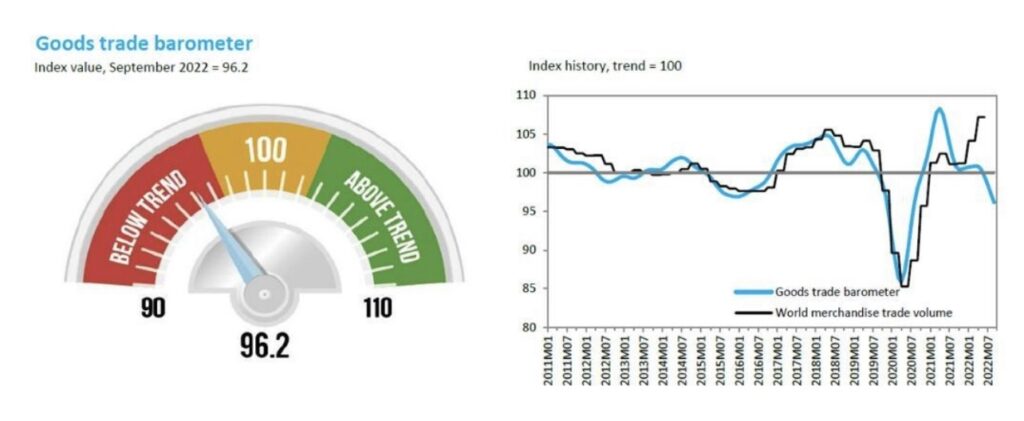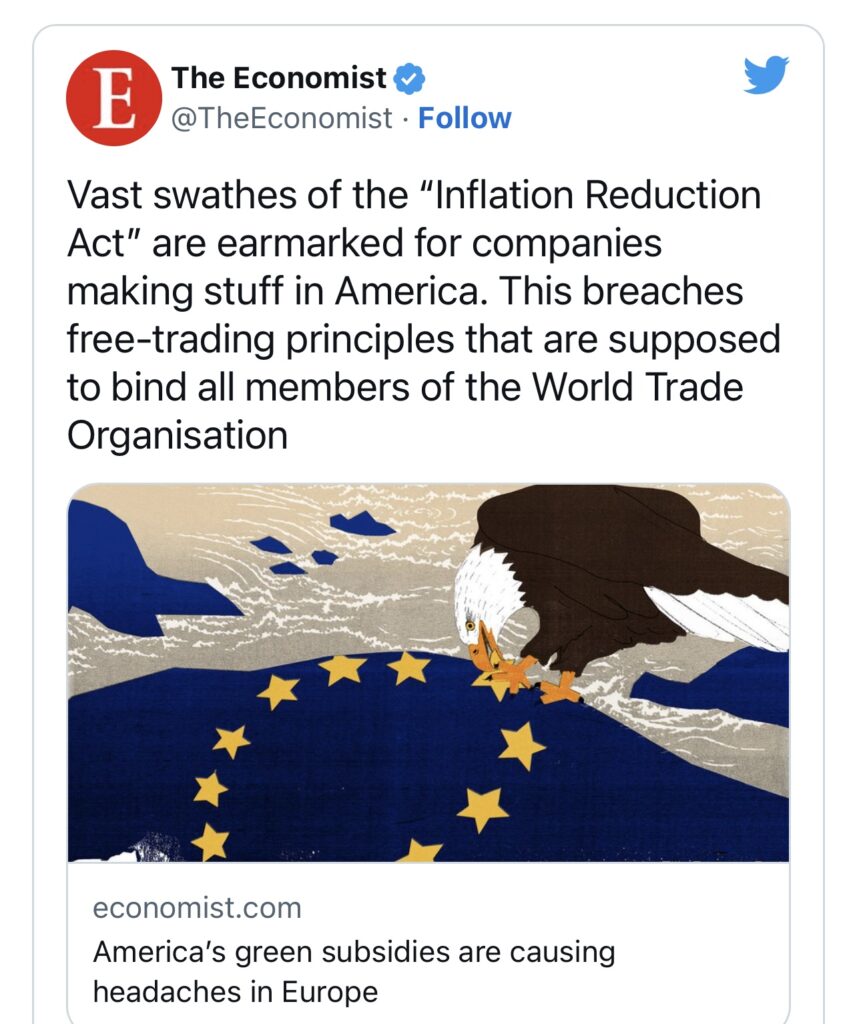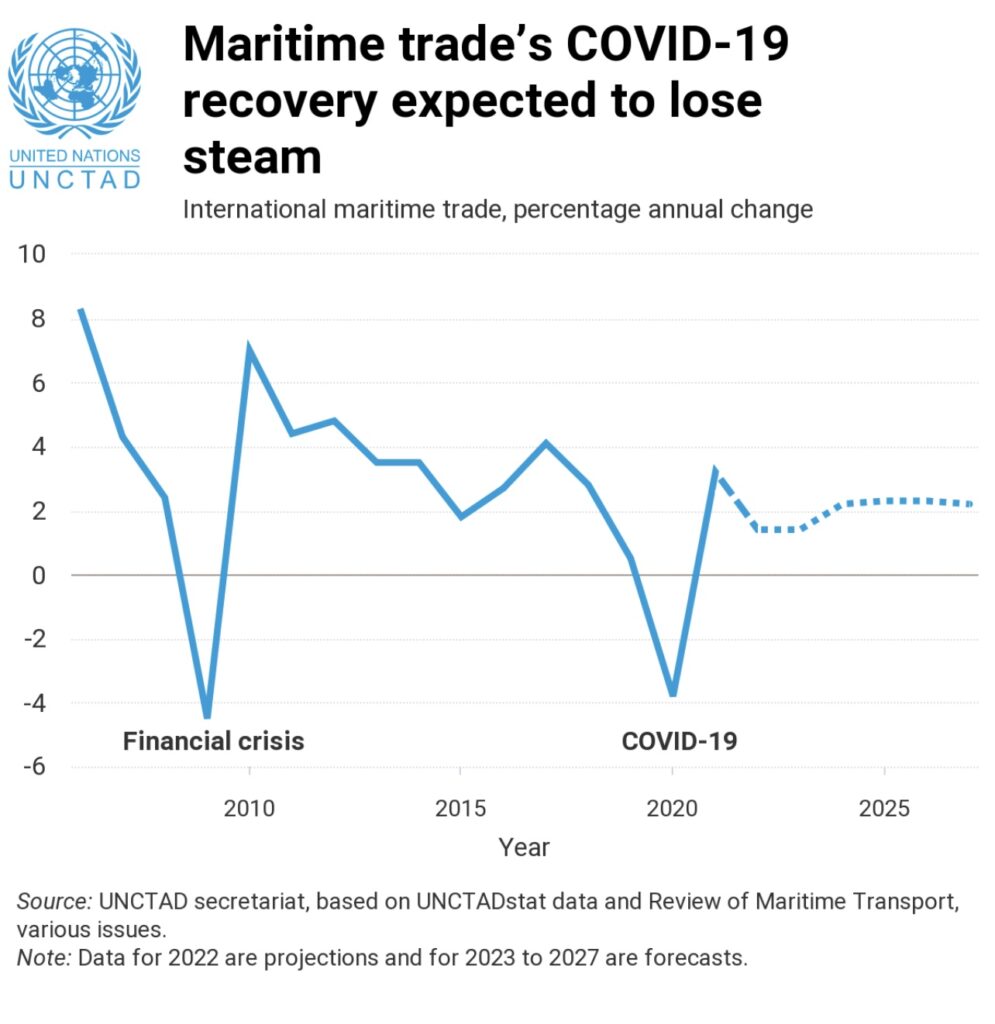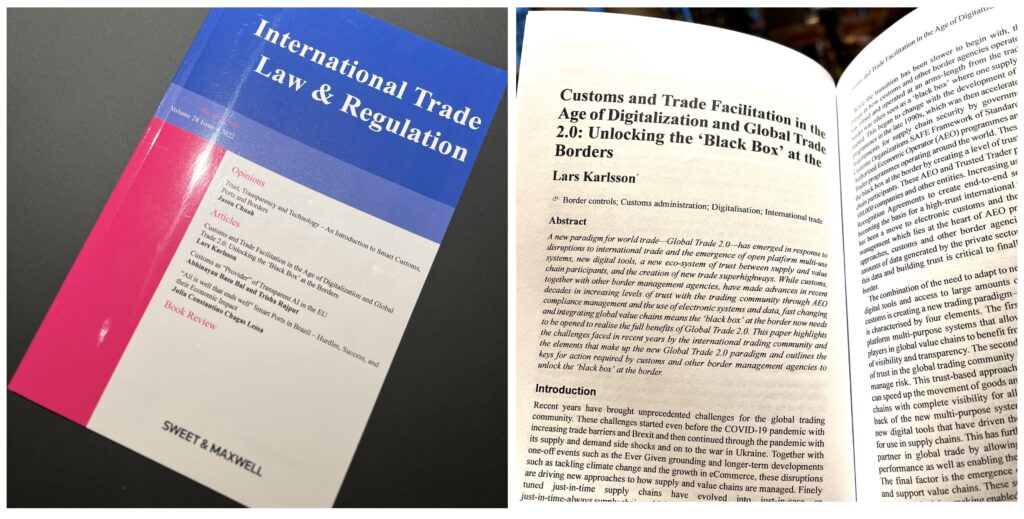1. Goods trade growth to slow in coming months: WTO
Global trade growth is likely to slow in late 2022 and into 2023 because of economic headwinds, according to the latest World Trade Organization (WTO) Goods Trade Barometer. The WTO has identified negative trends in export orders, air freight and electronic components, all of which suggest cooling business sentiment and weaker global import demand.

The barometer provides real-time information on the trajectory of merchandise trade relative to recent trends. Its current reading is 96.2 – values of less than 100 indicate below-trend growth, while values greater than 100 signal above-trend expansion.
2. US clean-tech tax breaks create EU trade tensions
US President Joe Biden has been trying to calm tensions with European leaders over his country’s plans to give companies tax credits and subsidies if they make clean technology products in North America.

There has been talk of a potential US-EU trade warover the issue. EU countries are worried that their companies will suffer due to the incentives offered under Washington’s Inflation Reduction Act (IRA). They also believe that many of the subsidies on offer potentially violate WTO rules.
3. WTO champions green trade
WTO Director-General Ngozi Okonjo-Iweala has called for trade to be part of the solution to climate change. “You need to have a friendly trade regime for renewables and other environmentally friendly products,” she told Reuters.
The WTO’s World Trade Report 2022, released at COP27, says the most realistic way to make deep emissions cuts without reducing living standards in richer countries and harming development prospects in poorer ones is through advancing low-carbon technologies. The report recommends cutting tariffs and other barriers for low-carbon industries, which tend to be higher than for carbon-intensive ones. It also says that countries with less diversified exports tend to be generally more vulnerable to climate change.
The Forum’s Climate Trade Zero initiative has identified a list of 25 technologies – as well as further guidance on inputs to those and relevant services – that policy-makers could prioritize to create these more friendly trade regimes.
Trade and environment discussions among a group of 70-plus WTO members in December committed to renewed efforts in 2023 on making trade sustainable. The group focuses on four areas – trade and climate action, trade in environmental goods and services, trade and the circular economy, and subsidies. Exceptionally, the discussions include non-governmental stakeholders to provide inputs on the challenges and opportunities.
4. Australia passes free trade deals, Britain on the hunt
Australia’s Parliament has passed free trade agreements with India and Britain. The deal with Britain will make more than 99% of Australian goods exports duty-free, including sheep meat, beef, dairy, sugar and wine, AP reports. The India agreement would cut taxes on 90% of Australian goods shipments, including on meat, wool, cotton, seafood, nuts and avocados. In October, it also reached a Green Economy Agreement with Singapore.
British Prime Minister Rishi Sunak meanwhile says he will not “sacrifice quality for speed when it comes to trade deals”, after criticizing the Australia deal before he became leader.
5. Shipping industry faces choppy waters in 2023
Container shortages are fast fading from memory, with the shipping industry now facing a surplusbecause of declining consumer demand for goods, CNBC says.
The pace of global shipping activity is set to lose steam in 2023, according to UN agency UNCTAD’s Review of Maritime Transport 2022. Shipping accounts for more than 80% of global trade shipments, but the world’s largest investment banks expect global economic growth to slow further in 2023, Reuters reports.

“The recovery in maritime transport and logistics is now at risk from the war in Ukraine, the continued grip of the pandemic, lingering supply-chain constraints, and China’s cooling economy and zero-COVID policy, along with inflationary pressures and the cost-of-living squeeze,” UNCTAD says in the report.
6. E-commerce trade to face new EU packaging rules
E-commerce traders in the EU may soon have to minimize the amount of empty space in packagingwhen they ship goods, following proposed revisions to EU legislation on packaging and packaging waste, Euractiv reports.
The draft changes would limit empty space in packaging to a maximum of 40%. “Double walls, false bottoms and other means to create the impression of increased product volume” would be banned, global logistics company DHL notes.
The EU wants to cut packaging waste in each member state by 15% by 2040, compared with 2018. This would lead to an overall waste reduction in the EU of 37%. It is looking to put in place mandatory rates of recycled content that producers have to include in new plastic packaging and to promote reusable or refillable packaging, including for e-commerce deliveries.
Packaging is one of the main users of virgin materials, with 40% of plastics and 50% of paper used in the EU is destined for packaging, the European Commission says.
Read the article here:
Source: WEF
”Our ability to pack information and integrate it with signals that come from outside of the ecosystem, is what gives us the edge. It’s what makes us a step ahead in delivering the right outcomes to our customers better and faster”.

Renu Khera, Data Lead at Maersk, is responsible of developing new ways we can utilize data to create new and better solutions for our customers.
She has worked with data for more than two decades and is motivated by the global impact her work has on the logistic industry.
Do you also want to play a part in developing the technology that moves the worlds goods?
Go to https://lnkd.in/egxRBEhY and apply today!
Don’t miss my latest published academic article, ’Customs and Trade Facilitation in the Age of Digitalization and Global Trade 2.0: Unlocking the ’Black Box’ at the Borders’ in International Trade Law & Regulation.

In a time of globalization, crises and disruption, we have seen riple effects at borders causing major delays and supply chain challenges for the integrated value chains of international.
In this article I explain what we can do about it and how we can remove uncertainty and provide improved resilience and predictability. How strategic customs planning can make your trade flow.
You find it here: https://www.sweetandmaxwell.co.uk/Product/International-Trade/International-Trade-Law-and-Regulation/Journal/30791309






You must be logged in to post a comment.